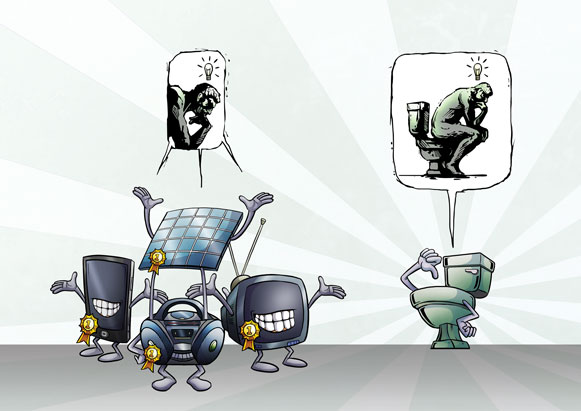Today is a big day! The UN has officially recognized November 19 as World Toilet Day, hopefully breaking taboos, unlocking important conversations on sanitation, and catalyzing action. The numbers on sanitation remain dire: by official estimates, 2.5 billion people lack access to improved sanitation, and diarrheal disease kills more children each year than AIDS, malaria, and measles combined. Getting people to talk about toilets is a tremendous step in the right direction, and now it’s time to take the next one.
In our field we’re often reminded that there are more people in the world with cell phones than with toilets, which may be one of the reasons Bill Gates wants to create the cell phone of sanitation. It’s critical to unpack these sound bytes, so we can actually learn to make toilets as (more!) widespread as phones. Here are a few lessons from cell phones that will help us move beyond the toilet.
1. Forget about cell phones. Think cell towers. Phones are great because they are portals to a cellular network, and they are precisely useless without it. Toilets are great, but they have little value without service- a mechanism to keep them functional and clean, and for handling the waste that gets deposited in them. In rural areas, users might be able to manage waste on site, but they still need a supply chain for parts, tools, and training. In dense urban areas, that service must almost inevitably be external, either through governments, the private sector, NGOs, or a combination. The quality and reliability of that service will determine whether a toilet is beneficial or not. That’s why we’re excited by the idea of Sanitation as a Business, and why we partnered with SOIL to provide lasting service in Cap Haitien.
2. Don’t sell a phone. Sell a plan. Safaricom doesn’t make money in Kenya by selling phones but by selling airtime. In the US, you can even get a phone for free with a two-year contract. Tons of people are stuck without sanitation because they don’t have several hundred bucks to build a toilet, or to pay to empty it after three years. With a portable toilet like ours, you could offer a free toilet with a sanitation service plan, providing predictable, affordable payments to reduce barriers to adoption.
3. Appeal to a better lifestyle. If you’ll look at Digicel billboards in Haiti, they appeal to everything we all value- community, fast information, flexibility, security, progress. Why do organizations try to promote toilets to users by talking about diarrhea? Sanitation promotion needs to appeal to users’ aspirations- convenience, privacy, cleanliness, comfort, style- a better life. That’s why we applaud our kindred spirits at x-runner, Sanergy, and CleanTeam for building their services around these hopes.
4. Don’t make it cheap. Make it a great deal. Even the cheapest cell phone was designed to look cool and sleek, and have great features that people want. People still rave about “Snake” on the original Nokias. No one wants something cheap- cheap things break, they look bad, they don’t work as advertised. Sometimes people won’t even want something if it looks cheap (check out “The Ugly Duckling” on page 41 of PATH’s report for an example of what we mean). We spend months with our users, learning what they aspire to, how their ideal toilet would look and feel. Then we spend months designing that toilet in a way that our users can afford it. We don’t design our toilets to be cheap, we design them to be great at an affordable price.
We could go on and on, but we’ll stop there. Next time someone talks to you about cell phones and toilets (admit it, it happens to you all the time), you’ll be able to add whole new layers to the conversation. We’re so excited that today is World Toilet Day, it’s a great milestone for all of us. And now that we’ve got you talking toilets, maybe we can also get you talking more, about service, marketing, aspirations, treatment, resource recovery, all the potential that lies beyond the toilet.

